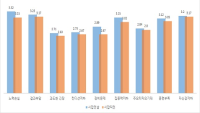
Purpose The purpose of this study was to provide useful information on the improvement of performance by measured the psychological-physiological stresses experienced by elite shooters during a competition. Methods Thirty-eight elite shooters participated in this study (Male = 13, Female = 25). Psychological stress was measured and used for this study based on the stress factors found in the elite target stress study by Park(2015). The cortisol, a physiological stress hormone, was measured using saliva. Results The reliability of the psychological stress sub-factor pre-post analysis results showed no statistically significant. The concentration of cortisol measured on the day before the competition (0.1704 µg/dL) significantly increased immediately before the competition (0.3558 µg/dL). Cortisol immediately before the competition showed negative correlation (r=-.361, p=.036) with the competition score, and the regression variable of cortisol was 13%. Conclusions In this study, physiological stress had a negative effect on elite shooters performance compared to psychological stress.



PURPOSE This study was conducted to investigate changes in stress before and after elite shooting athletes participate in a match, and to find out the effect on the match score. METHODS Thirty-wight elite shooting athletes were sampled, questionnaires were distributed to measure psychological stress before and after the match, and saliva was collected before and after the match to measure cortisol. In addition, psychological stress and changes in cortisol before and after the game were investigated, and how psychological stress before and after the game and cortisol affect the score of the game were investigated. Accordingly, a statistical analysis based on data analysis was conducted, and the following research results were obtained. RESULTS The pre-match analysis of psychological stress and cortisol revealed statistically significant changes; both post-match stress and cortisol decreased compared to before the match. Increased psychological stress and cortisol both before and after the match had a negative effect on the match score. CONCLUSIONS These findings confirmed that shooters experience very strong psycho-physiological stress before the match, and the stronger the psychological stress, the lower the game score.
The purpose of this study was to examine the effects of happiness improvement program on psychological variables which were happiness feeling, self-esteem, interpersonal relationship, internal-external locus of control, stress, coping, perceived performance and physiological variables such as cortisol and serotonin of collegiate badminton players. The participants consisted of 10 collegiate badminton players. Happiness improvement program for collegiate badminton players was developed by previous literatures, in-depth-interview, psychological test data, and consultation of happiness improvement experts. The happiness improvement program consisted of 12 intervention program: orientation, rapport development and the understanding happiness, self-esteem enhancement techniques, interpersonal relationship strategies, stress and coping management, peak performance methods, and action plan of happiness improvement program. Each program was applied to participants in about 90-120 minute a session(2-3 times session a week). The instruments of this study were made up of three broad categories: (a) psychological data, b) physiological data, and (c) qualitative data. Firstly, happiness improvement program significantly increased happiness feeling, self-esteem, internal-external locus of control, interpersonal relationship capability, coping skills of collegiate badminton players. Secondly, happiness improvement program significantly decreased stress of collegiate badminton players. Thirdly, participants positively perceived the effects of happiness improvement program on psycho-physiological variables. The limitations of this study and future implications were discussed.